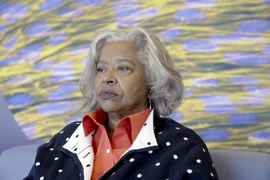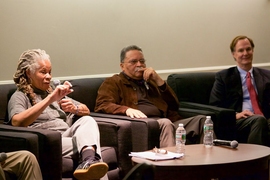When Massachusetts voters head to the polls on Nov. 6 for the 2018 midterm election, one of the items they’ll find on the ballot is Question 3, about whether to uphold a 2016 state law barring discrimination against transgender people in public spaces such as stores and restaurants.
With the election drawing near, MIT News spoke with interim Institute Community and Equity Officer Alyce Johnson, who leads the ICEO in its mission to advance a respectful and caring community that embraces diversity and empowers everyone to learn and do their best at MIT.
Johnson spoke about the Institute’s commitment to protecting the rights of transgender members of the MIT community, regardless of the ballot initiative’s outcome, and why respectful, open dialogue is an essential component of MIT’s campus life.
Q: What would be the effect on MIT policies if Question 3 does not pass, and the law protecting transgender people from discrimination in public places is overturned?
A: MIT’s senior administration and I want our community to know that our support for MIT’s transgender community is steadfast, and that the Institute’s nondiscrimination policy, which expressly prohibits discrimination based on gender identity, will remain in place if the state law is repealed following the Nov. 6 election. The same will be true if the federal government more narrowly defines gender under federal law, a change that is reportedly under consideration. I want to reassure our community that MIT is permitted to offer antidiscrimination protections that are broader than what is protected by state and federal law. The Institute’s policies will continue to prohibit discrimination or harassment at MIT based on sex, sexual orientation, and gender identity.
In addition to the policies we have in place, our unwavering commitment to the rights of transgender students, staff, and faculty will also continue regardless of the outcome of the election or of any potential federal policy changes. As just one example, the pilot project to designate certain all-gender restrooms on campus will keep moving forward.
We are working very hard to provide resources and support for those who feel under attack or not safe. The chancellor’s office is doing a great job, with events planned through the Division of Student Life and the Office of Minority Education (OME), of providing welcoming spaces for students during and after the election. The Rainbow Lounge and SPXCE Intercultural Center will both have open houses on Nov. 6 and Nov. 7. And, on Nov. 7, students can gather in the Student Center (PDR 1 and 2) from 3 to 5 p.m. for cookies, community, and conversation. OME is holding several events, including Let’s Chat in the OME with Student Mental Health and Counseling on Nov. 6 from 5:20 to 7 p.m. and on Nov. 7 from 3:00 to 5 p.m.
For faculty, staff, postdocs, and family members, My Life Services offers expert counseling support and resources. The LBGTQ Employee Resource Group is also available to support our employees.
Q: For many, anticipation about the outcome of the November elections is high. Can you talk about why being active, engaged citizens, as well as promoting respectful dialogue among people with different political beliefs, is important to the MIT community and a priority for the ICEO?
A: This moment offers an opportunity to recommit to our values around mutual respect, openness, and integrity at MIT. Regardless of differences in opinion, we are committed to looking after each other, whatever the issue is, in the best of times and the worst of times.
The MIT culture rests with its citizens. We are a community that includes differences, and acknowledges and leverages those differences through studying and working together, and by having conversations that bring greater understanding of each other. It makes us a better organization when we can honor our differences and learn to have civil discourse in conversations about difficult topics. I learn from you because the lens through which you see things is different from my own lens. That’s what promotes understanding.
Q: One of the ways the ICEO operates is to partner and coordinate with other offices and organizations at MIT working to further diversity, inclusion, and civic engagement. From this vantage point, can you describe some of the activities on campus in the days leading up to the election?
A: There has been a surge of activities to help raise awareness and get out the vote at MIT. The ICEO recently partnered with the LBGTQ Employee Resource Group for an event we called “ICEO Community Town Hall: Trans Rights.” The session focused on a discussion about the current state of transgender rights in Massachusetts, and featured MIT students, alumni, staff, and faculty members.
Last year, a group of undergraduate and graduate students, the chancellor’s office, registrar, and Priscilla King Gray Public (PKG) Service Center implemented TurboVote, a nonpartisan, nonprofit platform, to increase voting and voter registration, and it’s been exciting to watch the initiative expand this fall.
A new nonpartisan student group called MITvote 2018, which works closely with the PKG Service Center, has been focused on voter registration and education. Through their work this fall, they’ve registered 1,056 people, which they estimate to be 13 percent of the eligible student voter population. On Oct. 30, they will be hosting a nonpartisan explanation of Massachusetts ballot races and initiatives with student political organizations in Room 4-370 from 7 to 8:30 p.m.
And, in response to Question 3, a group of students formed “Yes on 3.” Through information sessions and study breaks, this group has been raising awareness among students that transgender protection is an issue in the Massachusetts 2018 election, and they’ve been working to register students to vote.









